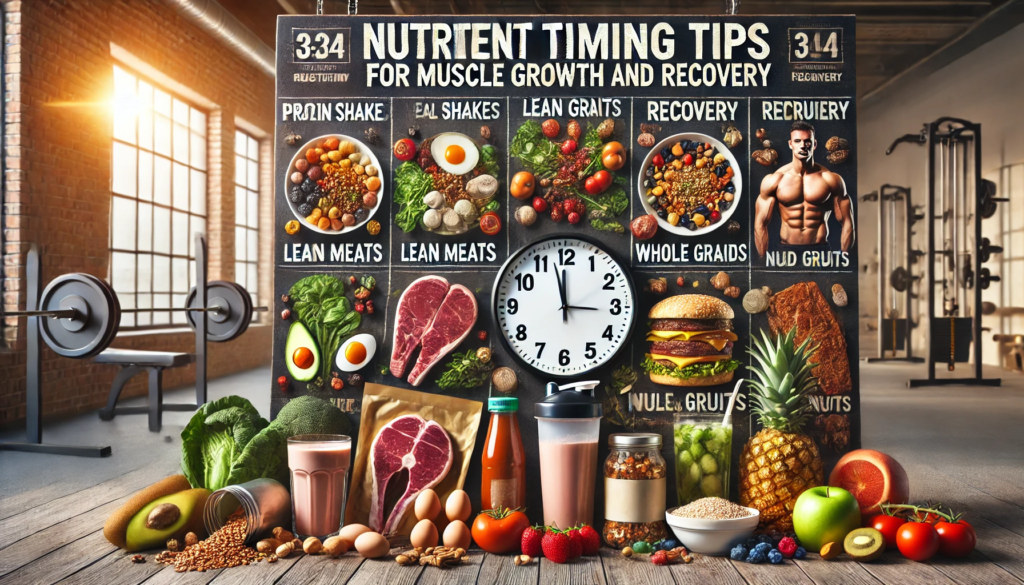
Top 20 Nutrient Timing Tips for Maximizing Muscle Growth and Recovery
Nutrient timing refers to strategically consuming specific nutrients, like protein and carbohydrates, around workouts to optimize muscle growth, recovery, and performance. Here are 20 tips for mastering nutrient timing to maximize your fitness results.
1. Eat a Pre-Workout Meal 2-3 Hours Before Exercising
A balanced meal 2-3 hours before your workout provides sustained energy. Include complex carbohydrates, protein, and healthy fats, such as chicken, brown rice, and avocado.
2. Focus on Carbs Before Your Workout
Carbohydrates provide the primary source of energy for your muscles. Eat a carb-rich snack or meal before your workout to enhance endurance and performance, such as a banana or oatmeal.
3. Include Protein in Your Pre-Workout Meal
Protein before exercise helps maintain muscle mass and supports muscle recovery. Include lean protein sources like chicken, eggs, or a protein shake in your pre-workout meal.
4. Stay Hydrated
Drink water throughout the day to stay hydrated. Proper hydration supports muscle function and helps you perform at your best during workouts.
5. Consume a Small Snack 30-60 Minutes Before Exercise
If you’re short on time, have a small, easily digestible snack 30-60 minutes before exercising. Choose a combination of carbs and protein, such as a piece of fruit with yogurt.
6. Fuel Your Workout with Intra-Workout Nutrition
For extended or intense workouts, consider consuming fast-digesting carbs during exercise, such as a sports drink or fruit. This can help maintain energy levels and prevent fatigue.
7. Eat a Post-Workout Meal Within 30-60 Minutes
Consuming a meal within 30-60 minutes after your workout helps replenish glycogen stores and kickstart muscle repair. Include protein and carbohydrates for optimal recovery.
8. Choose Fast-Digesting Protein After Exercise
Fast-digesting protein, such as whey protein, is ideal for post-workout recovery because it quickly supplies amino acids to the muscles. A protein shake is a convenient option.
9. Don’t Skip Post-Workout Carbohydrates
Carbs are essential for replenishing glycogen stores and aiding recovery. Combine your post-workout protein with carbs like sweet potatoes, rice, or fruit.
10. Aim for a 3:1 Carb-to-Protein Ratio Post-Workout
For optimal muscle recovery, aim for a carb-to-protein ratio of 3:1 in your post-workout meal. For example, consume 60 grams of carbs and 20 grams of protein.
11. Spread Protein Intake Throughout the Day
Consume protein at regular intervals (every 3-4 hours) to promote muscle protein synthesis. This supports continuous muscle repair and growth.
12. Include Casein Protein Before Bed
Casein is a slow-digesting protein that provides a steady release of amino acids during sleep. Consider a casein shake or cottage cheese before bed to support overnight muscle recovery.
13. Use BCAAs for Fasted Training
If you prefer training on an empty stomach, supplementing with branched-chain amino acids (BCAAs) can help reduce muscle breakdown and preserve muscle mass during fasted workouts.
14. Have a Protein-Rich Breakfast
Start your day with a high-protein breakfast to jumpstart muscle protein synthesis. Eggs, Greek yogurt, or a protein smoothie are great choices.
15. Adjust Carb Intake Based on Training Intensity
Consume more carbs on high-intensity training days to fuel your performance and recovery. On rest days or low-intensity training days, reduce carb intake.
16. Use Electrolyte Drinks During Long Workouts
Electrolyte drinks can help maintain hydration and replace lost minerals during long or intense workouts. Look for drinks that contain sodium, potassium, and magnesium.
17. Prioritize Whole Foods
Focus on whole foods for nutrient timing, such as lean meats, fish, eggs, whole grains, fruits, and vegetables. These foods provide essential nutrients for muscle growth and recovery.
18. Include Omega-3 Fatty Acids in Your Diet
Omega-3s have anti-inflammatory properties that help reduce muscle soreness and support recovery. Include sources like salmon, chia seeds, or fish oil supplements.
19. Track Your Nutrient Timing
Use a nutrition app to log meals and track nutrient timing. This helps ensure you’re getting the right nutrients at the right times for optimal muscle growth.
20. Listen to Your Body
Everyone’s nutritional needs are different. Pay attention to how your body responds to different nutrient timing strategies and adjust your approach accordingly.
Conclusion
Mastering nutrient timing can help you maximize muscle growth, enhance recovery, and improve overall performance. By following these 20 tips, you can strategically fuel your body before, during, and after workouts to achieve the best results. Focus on protein, carbs, and hydration, and tailor your nutrient timing to your training intensity and individual needs.
FAQ
1. What is nutrient timing?
Nutrient timing is the strategic consumption of specific nutrients, such as protein and carbohydrates, around workouts to optimize muscle growth, recovery, and performance. It involves eating the right foods at the right times to support training goals.
2. Why is nutrient timing important for muscle growth?
Proper nutrient timing helps maximize muscle protein synthesis, replenish glycogen stores, and reduce muscle breakdown. Consuming the right nutrients before and after workouts can enhance muscle growth, speed up recovery, and improve overall performance.
3. How soon after a workout should I eat?
It’s recommended to eat a post-workout meal within 30-60 minutes after exercise. This window is considered the “anabolic window,” when the body is most receptive to nutrient absorption, helping to kickstart muscle repair and replenish energy stores.
4. What should I eat before a workout?
Consume a balanced pre-workout meal 2-3 hours before exercise, including complex carbs, lean protein, and healthy fats. This provides sustained energy and supports muscle performance. For a quick snack 30-60 minutes before exercise, choose easily digestible carbs and a small amount of protein.
5. Is it necessary to eat protein immediately after a workout?
While consuming protein soon after a workout is beneficial, the overall daily protein intake is more important for muscle growth. Aim to spread protein intake throughout the day, with some protein consumed post-workout to aid in recovery.
6. Should I avoid fats around workouts?
It’s best to limit fat intake in pre- and post-workout meals, as fats can slow digestion. However, including small amounts of healthy fats in your overall diet is important for health and recovery.











